Rostchi Forum: Tatarstan invites China to auto industry, and Komi and Kirov Region — to the forest
Trade turnover between China and Tatarstan amounts to $1,6 billion and is going to increase significantly by the end of this year
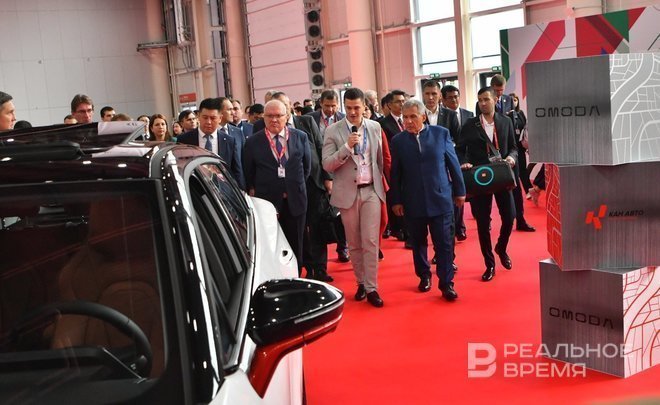
“Russia and China can work as actively as possible at the interregional level," Rustam Minnikhanov said, calling on Chinese businesses to have closer contacts with Russian regions. It would seem that the first Russian-Chinese forum Rostchi in Kazan has given a start to strengthening economic relations, but in reality, China is a long-standing partner of the republic. At the exhibition, the Tatarstan leader studied Chinese cars assembled at Avtotor in Kaliningrad with such a passion that he “missed” the novelty of the Chinese automotive industry. At the same time, governors of forest-rich regions were looking for new opportunities to expand timber exports.
Stepping into the second billion
A representative delegation arrived at the opening of the first Russia-China International Forum. About 200 companies of China. This is the absolute majority of representatives of Chinese businesses interested in expanding cooperation with Russia. Why Kazan?
“Tatarstan has shown good results of cooperation, there is a good investment climate here," Chairman of the Union of Chinese Entrepreneurs in Russia Zhou Liqun told Realnoe Vremya before the exhibition.
Not to be unfounded, the interlocutor of the publication gave specific figures.
“The trade turnover between China and Tatarstan amounts to $1,6 billion, and I think that by the end of the year this figure is going to grow significantly," he said.
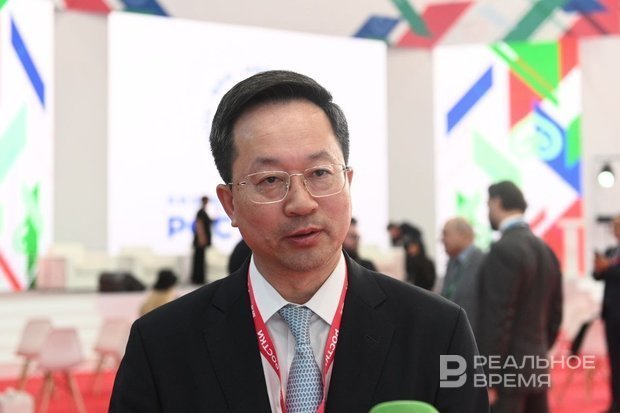
According to him, the visit of large Chinese companies to Kazan confirms their interest in expanding cooperation with Russia. Among the guests — representatives of companies from the provinces of Shandong, Hunan, Sichuan, Anhui, Heilongjiang, Zhejiang, Chongqing, with which Tatarstan has signed interregional intergovernmental agreements.
“There are many projects here. Alabuga economic zone is of interest to many Chinese investors," the Chinese entrepreneur noted.
According to him, mechanical engineering, power grids, infrastructure, and KAMAZ are of particular interest to business representatives from China, and the successful example of Haier motivates them to follow its path.
We are waiting for concrete agreements
Indeed, China is such a long-standing partner of Tatarstan that a “honeymoon phase” in relations is behind.
“We are waiting for concrete agreements between Russian and Chinese companies in various forms," said Rustam Minnikhanov at the opening of ROSTCHI business forum, stressing that the meeting with Chinese businesses is taking place in this format for the first time, and expressing gratitude for that Chinese partners responded to the invitation. “Russia and China can work as actively as possible at the interregional level.”
In conclusion, he invited the guests to take part in the second ROSTCHI business forum, which is held from November 14 to 18 in Kazan.
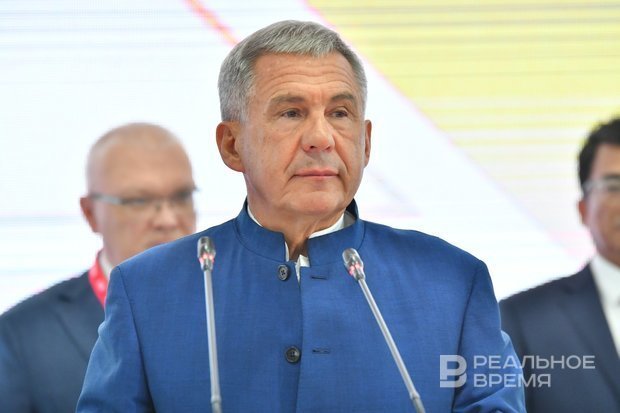
Having picked up this idea, the head of the Komi Republic, Vladimir Uyba, announced his readiness to expand the export of wood, mineral fertilisers, and coal. He came to Kazan at the invitation of the leadership of Tatarstan.
“China is the largest partner of Komi. We hope that this forum will help strengthen our ties," he said.
Alexander Sokolov, the governor of Kirov Oblast, spoke in the same vein: “The leaders of Russia and China have created the basis for long-term cooperation between our countries with their friendly and businesslike attitude. I am sure that this cooperation will bear fruit in the near future. This is the interaction of regions, enterprises, and specific people. This forum is an important event for establishing this interaction. Kirov Oblast is now dynamically developing and expanding its interregional and international relations. We already have good examples of cooperation between enterprises in our region and enterprises in China: we supply timber industry products, fertilisers. Chinese partners supply us with machine-tool and machine-building products. I believe that we have great opportunities for a fundamentally new level of cooperation.”
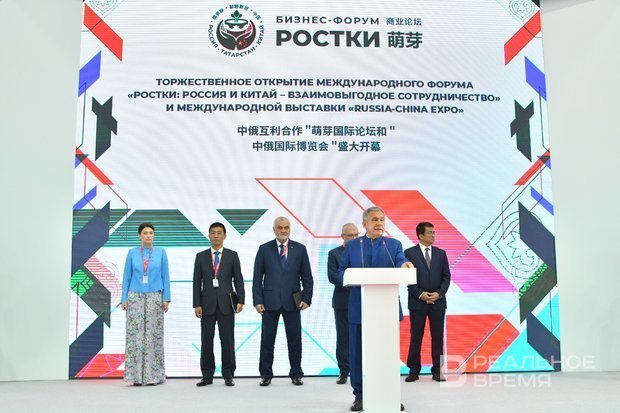
Secret meaning of Rostchi
Yu Hongchi, Economic and Commercial Counselor of the Chinese Embassy in Russia, was optimistic about expanding cooperation with Russia. He recalled that this March, Chinese President Xi Jinping made his first visit to Moscow immediately after being elected as chairman, after which economic relations between the two countries began to grow.
China's foreign trade turnover with Russia increased by 36% and amounted to $134 billion, the speaker said. Haier became one of the major investors of China, which built a plant in Naberezhnye Chelny. For 13 years, several large-scale forums have been held to strengthen cooperation, but he is waiting for the most important event next year.
“The BRICS summit is held in 2024, which is expected to provide new opportunities and give impetus to our countries," Yu Hongchi said.
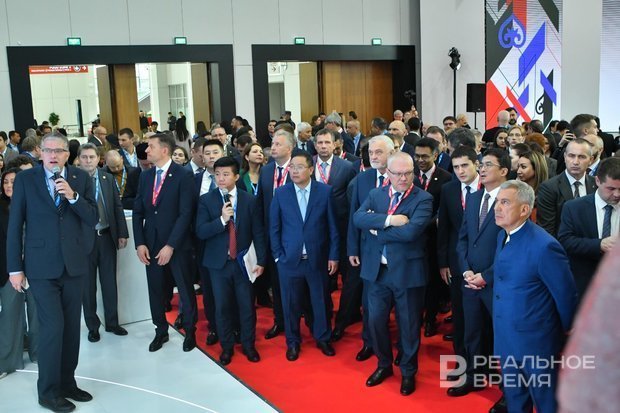
In conclusion, he decided to explain why the forum is called Rostchi. “The first part of the name means 'Russia', the second part means 'China', and the letter 'T' between them — 'Tatarstan'," he decomposed the transcription of the word in purely Russian.
On the red carpet
After that, Rustam Minnikhanov, Alexander Sokolov, and Vladimir Uyba, together with Chinese businessmen, went to tour the exhibition of industrial achievements. Tatneft, SIBUR, TAIF-NK, Alabuga, Gazprombank kept the expositions from the TatOilExpo 2023 exhibition, without taking them out of Kazan Expo before the Russian-Chinese forum. And behind their stands on the red carpet, there were sparkling SUVs and luxury sedans. Above them, there were signs of the brands — Haval, Chery, Exeed. In total, 24 models of luxury cars were exhibited. And the flagship of the exposition was the gray Tank 500 SUV, the deliveries of which began in Russia in February this year. The base price is from 8 million rubles.
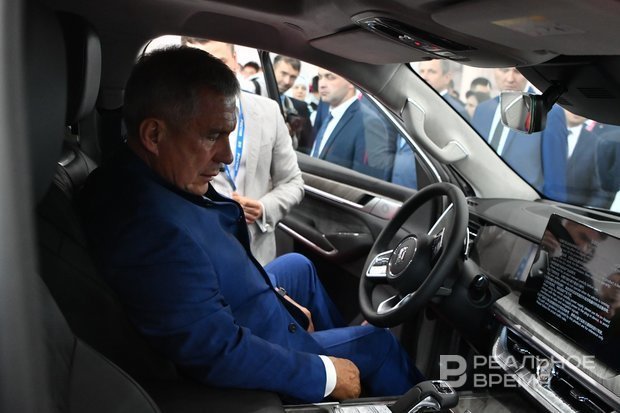
“Tank 500 is a novelty only for Russian motorists. Its premiere took place in China three years ago, they have been buying it there for a long time," said the dealer of this brand in Kazan.
Rustam Minnikhanov examined with passion only those Chinese cars that are assembled in Russia. Among them, the most popular models are Kaiyi E5, Baic x35, Baic u5 plus, and Haval Jolion. The industrial assembly of the first two was established at Avtotor plant in Kaliningrad. Their cost is comparable to the price tag for Lada cars and starts from 2 million rubles. “What good fellows they are!” said the rais of the republic. However, later it became known that the assembly of construction machinery of the Chinese Sany Group Company can be arranged in Tatarstan. In the afternoon, Rustam Minnikhanov met with Anton Nikolaev, the director of business development at SANY in Russia, who spoke about plans to localise his production facilities in Russia, the press service of the rais of Tatarstan reported.
Among those who work closely with the Chinese automotive industry — Raritek Group of Companies in Naberezhnye Chelny. A few years ago, they bought the design documentation for the assembly of Lotos city buses from Foton.
“We have a plan to deploy the assembly of buses on a full cycle, although it was possible to just buy buses. But we decided to master it at home and now we pay royalties for documentation. Now the Lotos bus is localised by 75%, but we still buy some of the components from Foton," said CEO Rafael Batyrshin.
In September, the company is going to launch the production of fuel tanks for liquefied natural gas, the design capacity is 5 thousand a year.
According to Timur Shagivaleev, CEO of Alabuga SEZ, the current problems in the domestic automotive industry could have been avoided if federal officials had responded to the initiative of the Tatarstan team for the assembly production of Chinese cars in the republic at the time.
“In 2006, when Alabuga SEZ was just created, one of the first potential residents who should have been there was the company Great Wall Motors, this is what is now essentially Haval. At that moment, our team was young, inexperienced and optimistic, we invested a lot of energy in convincing them that these were not primitive cars, they had a future. But the Ministry of Economic Development and the Ministry of Industry and Trade of Russia did not hear us. They said that there were European cars, there were American cars that were better. Probably, at that time it was so. And as a result, then this decision was not made. I think that if it was adopted, the localisation of production today would have been 90%. And Western sanctions pressure would be perceived much easier," Shagivaleev said.
But as they say, if it wasn’t for bad luck, I wouldn’t have no luck at all. The sales of Chinese cars are breaking all records. According to analysts of Otkritie Avto, in the first half of 2023, automakers from China have already sold more cars in our country (168 thousand) than in the whole of last year, increasing the market share from 10,6% to 46%.